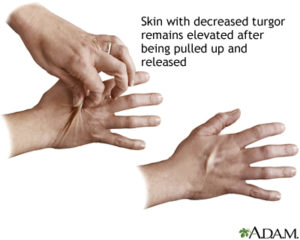Dehydration |

DefinitionDehydration occurs when your body does not have as much water and fluids as it should. Dehydration can be mild, moderate, or severe, based on how much of your body’s fluid is lost or not replaced. Severe dehydration is a life-threatening emergency. CausesYou can become dehydrated if you lose too much fluid, do not drink enough water or fluids, or both. Your body may lose a lot of fluid from:
You might not drink enough fluids because:
Older adults and people with certain diseases, such as diabetes, are also at higher risk for dehydration. SymptomsSigns of mild to moderate dehydration:
Signs of severe dehydration:
Exams and TestsYour health care provider will look for these signs of dehydration:
Your doctor may do lab tests:
TreatmentTo treat dehydration:
For more severe dehydration or heat emergency, you may need to stay in a hospital and receive fluid through a vein (IV). The provider will also treat the cause of the dehydration. Dehydration caused by a stomach virus should get better on its own after a few days. Outlook (Prognosis)If you notice signs of dehydration and treat it quickly, you should recover completely. Possible ComplicationsUntreated severe dehydration may cause:
When to Contact a Medical ProfessionalYou should call 911 if:
PreventionTo prevent dehydration:
ReferencesKenefick RW, Cheuvront SN, O’Brien KK. Dehydration, rehydration, and hyperhydration. In: Auerbach PS. Wilderness Medicine. 6th ed. Philadelphia, PA: Elsevier Mosby; 2012:chap 70. Padlipsky P. Infectious diarrheal disease and dehydration. In: Marx JA, Hockberger RS, Walls RM, et al, eds. Rosen’s Emergency Medicine: Concepts and Clinical Practice. 8th ed. Philadelphia, PA: Elsevier Mosby; 2014:chap 173. |
